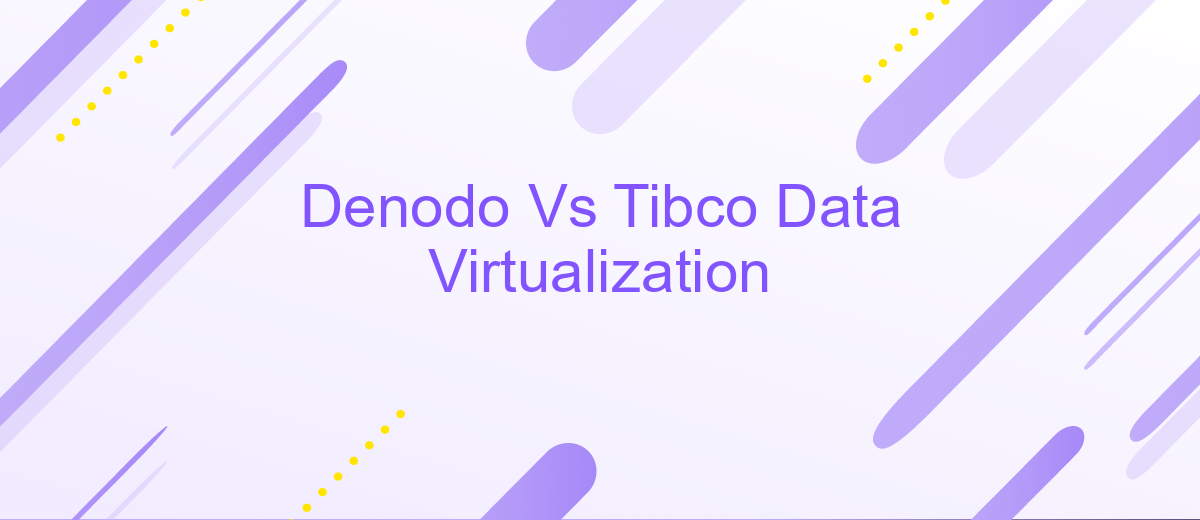Denodo Vs Tibco Data Virtualization
In today's data-driven world, choosing the right data virtualization platform is crucial for efficient data management and integration. This article provides a comparative analysis of two leading solutions: Denodo and Tibco Data Virtualization. By examining their features, performance, and ease of use, we aim to help organizations make an informed decision that best suits their data needs.
Overview
Denodo and Tibco Data Virtualization are two prominent solutions in the field of data integration and management. Both platforms aim to simplify access to diverse data sources, providing a unified view of data without the need for physical consolidation. This approach helps organizations make more informed decisions by leveraging real-time data from various systems.
- Denodo: Known for its advanced data virtualization capabilities, Denodo offers high performance, extensive connectivity options, and robust security features.
- Tibco Data Virtualization: Tibco focuses on providing seamless data integration with a strong emphasis on scalability, real-time data access, and comprehensive support for various data sources.
Both Denodo and Tibco Data Virtualization support integration with external services to enhance their capabilities. For instance, ApiX-Drive can be used to automate and streamline data integration processes, reducing the complexity of setting up connections between disparate systems. This makes it easier for organizations to maintain data consistency and accuracy across their operations.
Key Features

Denodo offers a robust data virtualization platform with features like real-time data integration, comprehensive data governance, and advanced security protocols. Its dynamic data cataloging and semantic search capabilities enable users to efficiently locate and utilize enterprise data. Denodo also supports a wide range of data sources, offering seamless integration through its intuitive interface, and provides extensive API support for custom integrations. For organizations looking to streamline their data workflows, services like ApiX-Drive can further enhance integration capabilities by automating data transfers between Denodo and other platforms.
Tibco Data Virtualization excels in providing a unified data layer that simplifies access to diverse data sources. Its key features include high-performance query optimization, extensive data source connectivity, and robust data transformation tools. Tibco's platform also emphasizes strong data security and compliance, ensuring that sensitive data is well-protected. Additionally, Tibco's advanced analytics and reporting tools deliver actionable insights, making it easier for businesses to make data-driven decisions. Integrating Tibco with services like ApiX-Drive can automate data workflows, enhancing efficiency and reducing manual intervention.
Architecture

Both Denodo and Tibco Data Virtualization platforms offer robust architectures designed to streamline data integration and management. Denodo employs a three-tier architecture consisting of the data abstraction layer, the data federation layer, and the data delivery layer. This structure allows for seamless integration, transformation, and delivery of data across multiple sources.
- Data Abstraction Layer: Simplifies data access by creating a unified view of disparate data sources.
- Data Federation Layer: Integrates data from various sources in real-time without physical data movement.
- Data Delivery Layer: Delivers integrated data to consuming applications and users efficiently.
Similarly, Tibco Data Virtualization uses a multi-layered architecture that includes data modeling, data integration, and data services layers. These layers work together to provide a unified, real-time view of data. Both platforms can be enhanced with integration tools like ApiX-Drive, which automates data synchronization and integration processes, further simplifying the data management landscape.
Use Cases

Denodo and Tibco Data Virtualization are powerful tools used to integrate and manage data from diverse sources. Both platforms excel in providing real-time access to data, enhancing decision-making processes for businesses. They are particularly useful in scenarios where data is spread across multiple systems and needs to be consolidated for analysis.
One common use case for these tools is in the financial sector, where quick and accurate data access is crucial for risk management and compliance. Another area is healthcare, where integrating patient records from various systems can significantly improve patient care and operational efficiency.
- Real-time data integration for business intelligence
- Data consolidation from multiple sources for analytics
- Enhancing data governance and compliance
- Improving operational efficiency in healthcare
For businesses looking to streamline their data integration processes, services like ApiX-Drive can be extremely beneficial. ApiX-Drive simplifies the setup of integrations, allowing for seamless data flow between different platforms. This ensures that organizations can leverage their data more effectively, making informed decisions faster.
Comparison
Denodo and Tibco Data Virtualization are two prominent platforms in the data virtualization landscape. Denodo excels in providing a comprehensive data integration solution with an emphasis on real-time data access and a robust set of connectors to various data sources. Its advanced caching and optimization techniques ensure high performance and scalability, making it suitable for large enterprises. Tibco Data Virtualization, on the other hand, offers strong data federation capabilities and seamless integration with Tibco's suite of products, providing a unified data view across disparate systems. Its user-friendly interface and extensive support for various data formats make it a versatile choice for businesses looking to streamline their data management processes.
When it comes to integration and automation, services like ApiX-Drive can play a crucial role. ApiX-Drive simplifies the process of connecting different applications and automating workflows, enhancing the capabilities of both Denodo and Tibco Data Virtualization. By leveraging ApiX-Drive, organizations can easily set up integrations without extensive coding, ensuring that data flows smoothly between systems. This not only reduces manual effort but also minimizes the risk of errors, ultimately leading to more efficient and reliable data management.


FAQ
What are the key differences between Denodo and TIBCO Data Virtualization?
Which platform is more suitable for real-time data integration?
How do Denodo and TIBCO Data Virtualization handle security and compliance?
Can Denodo and TIBCO Data Virtualization be integrated with automation tools?
Which platform offers better support for big data environments?
Routine tasks take a lot of time from employees? Do they burn out, do not have enough working day for the main duties and important things? Do you understand that the only way out of this situation in modern realities is automation? Try Apix-Drive for free and make sure that the online connector in 5 minutes of setting up integration will remove a significant part of the routine from your life and free up time for you and your employees.

